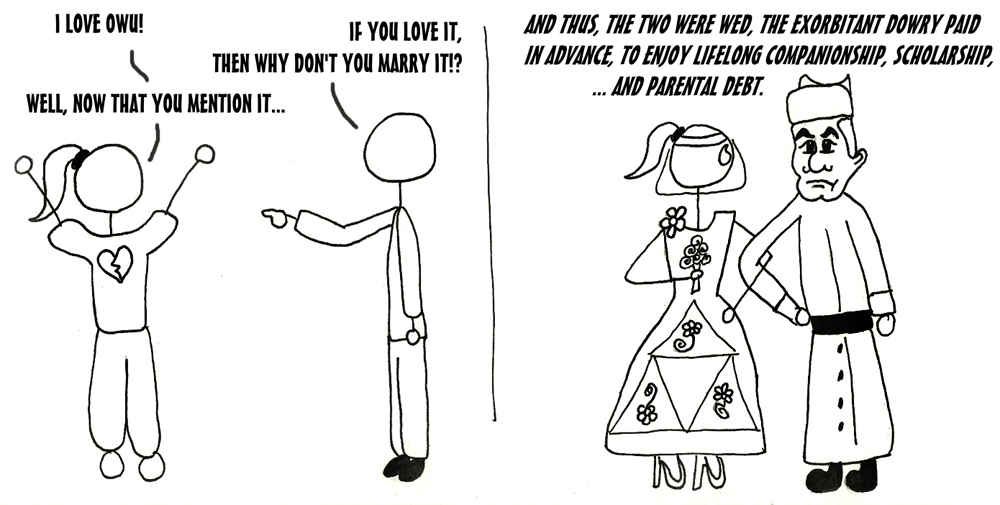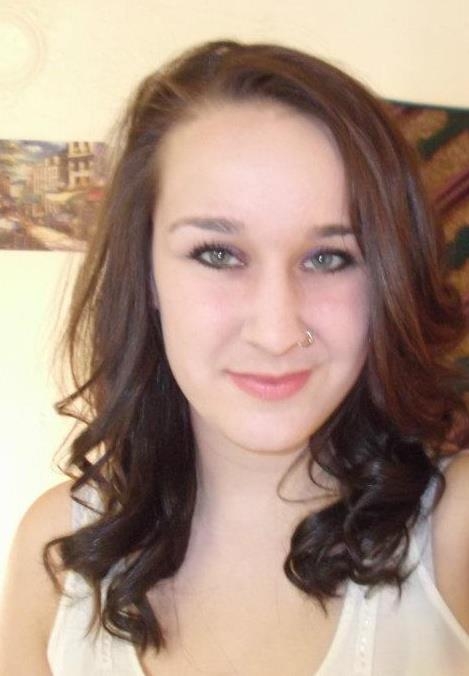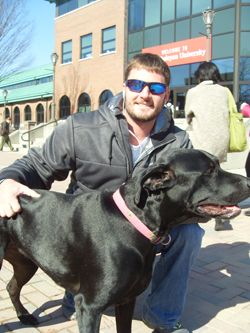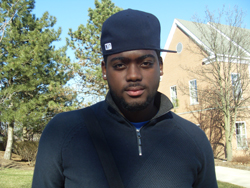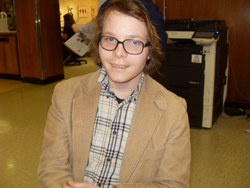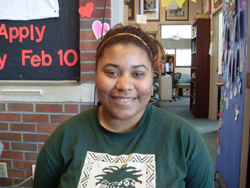Freshman Mary Corbett and Sarah McQuade were once rivals but now work together on the Ohio Wesleyan Women’s Basketball team.
Corbett and McQuade went to competing High Schools in Ohio and the two became known for their rivalry due to their similar skill set, age, and talent.
Corbett and McQuade first met their junior year of High School at a basketball program where the two, much to spectator’s surprise, became close friends.
“At first it was awkward because we knew who each other were but we became best friends after playing with each other,” Corbett said, “She is a reason I came to Ohio Wesleyan because I knew we both came from successful high school teams where we both had been very well coached and I liked the idea of being on the same team as her.”
McQuade echoed Corbett’s thoughts and feel the two work very well together.
“I think it makes us play better together because we both know each other’s strength and weaknesses and what each other is going to do out on the court,” McQuade said, “Our rivalry in high school doesn’t affect us at all but to outsiders, I’m sure they think it’s funny to see us playing together.”
The Bishop’s are in somewhat of a transitional year, their assistant coach for the last four seasons, Stacey Reed, has now become their head coach and the young team is lead by mostly freshman and sophomores.
Freshman Caroline Welker, who was the top scorer in the team’s December 31 game against Wittenberg with 18 points, believes the team is constantly improving the way they work together.
“We have been continually improving throughout the season, but we have still have been struggling to bring it all together in one game,” Welker said.
McQuade believes the team’s task to replace three leading scorers from last year is happening at a steady rate.
“If you just looked at our record, most would say we’re having a down year but were growing together. There are four freshman starting and a sophomore so we are very young,” McQuade said.
Corbett also believes the team’s transitional phase will pay off going into the end of the season.
“I think our performance this year has not been a direct reflection of all the talent and potential we have as a team,” Corbett said, “We have gone through a lot this year as a team and I think our experience now will help us grow for the end of the season.”
The Bishop’s defeated Oberlin on Saturday 81-74 and their record currently is 8-13. The Bishops next home game is Wednesday against Wooster in the Branch Rickey Arena.
Students hopeful with dates after date auction
Rafiki Wa Afrika’s first Date Action raised auction prices skyward while overall funds were well beyond expectations.
All proceeds are going toward the Ghana Student Education Fund, an organization that looks to better the education of students in Ghana and allows brilliant and deserving children a chance at achieving their dreams.
Students gathered in the Hamilton-Williams Campus Center Atrium on Friday at lunchtime to watch their fellow classmates be auctioned off, and to have a chance to bid on someone. There were 17 students auctioned off; eight women and nine men.
The opening bid was $10, and the auctioned-off date would accompany the highest bidder to a fixed dinner at Bun’s Restaurant later that evening. There was plenty incentive to make a bid: all of the students being auctioned off were dressed to impress, lobster was on the menu and all the proceeds were going to a good cause.
Sophomore Sophie Kiendl attended the auction and had hopes of bidding on her fellow classmate and friend Dylan Porter. But when someone bid $70 on him Kiendl couldn’t offer any more money, explaining that Porter is a great guy, but he wasn’t worth that high a price.
Other students thought differentl
about shelling about large amounts of cash, especially sophomore Elizabeth Smith, who bid $300 on sophomore Danyal Omar.
Junior Jacqueline Osei-Bonsu, who led and ran the date auction, said that Smith was excited to donate the $300 because she cares so much about the Ghana Student Education Fund, and wanted to take Danyal out for a nice meal.
This was the first time Rafiki Wa Afrika has ever held the auction, so Osei-Bonsu anticipated running into a few organizational problems.
“It was really hard getting people together and trying to finalize things when we couldn’t reach people, but in the end it all came together,” she said.
Osei-Bonsu said that the main problems included finding a place for the students to have their date and rounding up the auctioneers. She said she was nervous that students wouldn’t bid, but was thrilled everyone was auctioned off, and the lowest bid was $20.
The total for all 17 students was $1075, with an average bid just above $60. This number was way above Rafiki Wa Afrika’s expectations.
The entire Rafiki Wa Afrika club was very excited about being able to donate $1075 to the Ghana Student Education Fund.
Sophomore Porter was asked if he would auction himself off for the cause, and he said he couldn’t say no.
“I’m always one for helping, and if my mere smile can help raise some money I’m totally in” said Porter. “I am a bit disappointed I wasn’t the highest bid, but hey I was nervous on stage and didn’t do questionable things like fellow auctioneer Pierre Freed did, like take my shirt off in efforts to raise more money. The dinner at Bun’s was quite the treat, and I got to meet new people. Overall I am happy I was able to contribute, and hope I can next year as well”.
Freshman Maria Urbina also auctioned herself off. She said she was originally nervous to go up on stage, but when two of her friends got into a bidding war, she said she was flattered.
Junior Chris Ostrowski ended up winning Urbina, but he was unable to take her on the date to Bun’s because he had a lacrosse game that night. Freshman Jane Suttmeier, a friend of Urbina, filled in for Ostrowski.
Suttmeier said although the atmosphere at Bun’s was a bit awkward between the other dates, she had a great time and was happy to see so many classmates participating in a great cause.
Because of the auction’s success, Osei-Bonsu and Rafiki Wa Afrika have plans of holding another next year.
“I feel the event went extremely well and I heard feedback from other people which helped in drawing my conclusion that it all turned out almost perfect and we just had to work on a few more things to make it perfect for next year,” said Osei-Bonsu.
Myths debunked during Siegfried lecture: Eating disorders are topic of discussion to promote treatment
Nicole Siegfried, an eating disorder lecturer, urged students to not fall prey to myths concerning eating disorders during her Feb. 9 lecture. Siegfried’s lecture was part of the Food Course Connection.
Assistant professors of Psychology, Vicki DiLillo and Jennifer Yates, hosted the lecture.
“[The] food course connection is one of those interdisciplinary course connections that is trying to look at a specific theme or topic from a variety of different disciplinary perspectives,” DiLillo said. “We thought that having someone who could come in and talk about eating disorders would be of interest to students and would be potentially helpful to them.”
Siegfried’s lecture dealt with myths behind eating disorders, such as eating disorders are effective weight management.
“The truth is, disordered eating such as restricting, vomiting, (or) laxative use are not only dangerous, but are not effective measures for weight loss,” Siegfried said during her lecture.
“In fact, a majority of individuals… who go on diets or severe diets gain their weight back and then some.”
Other myths included the modern adage that says most college freshmen gain 15 pounds.
“This is actually a myth,” Siegfried said. “It makes it more likely that [college freshmen] might set the stage for restrictive eating.”
Siegfried said half of freshmen will gain weight and another half will lose. However, the difference between them is only five pounds.
Siegfried, who works at a treatment facility for those who suffer from eating disorders, speaks at many events, both in her area and at national conferences.
“I really want to help educate especially college students on what eating disorders are, understanding how to identify them either in themselves or their friends and how best be able to approach someone who has an eating disorder to help get them the help they need,” Siegfried said before the lecture.
Senior Ane Shoemaker was one of many students to attend the lecture.
“I have had an eating disorder in the past, and so I’m interested in seeing more modern information on it and just being updated on that information,” Shoemaker said. “Some of the myths were surprising to me.”
Siegfried mentioned many ways to help loved ones who may have/have an eating disorder. Siegfried also mentioned that using phrases like, “You look too thin,” should be avoided, since that may send the message whatever disordered eating is being practiced is working
Shoemaker had advice to those who may be approached about having an eating disorder.
“Be open,” Shoemaker said. “If someone approaches you; they’re really trying to help you. They care about you, they’re not trying to bring you down. They’re worried about your survival. They don’t want you to get hurt or fall prey to this more than you already are.”
Tips to help those with eating disorders:
– Set a time to talk.
– Communicate your concerns
– Ask your friend to explore these concerns
– Avoid conflicts or a battle of the wills
– Avoid placing shame, blame or guilt
– Avoid giving simple solutions
– Express your continued support
Students want changes in dining
Bishops can expect several new dining alternatives on campus beginning next year, as WCSA and Chartwells work to expand options.
According to junior Anthony McGuire, WCSA President, students and staff can expect extensive changes to campus dining.
“They want to expand the food court in Ham-Wil, add a fourth register, and put in a salad bar,” McGuire said. “They’re also planning to bring in new options like Papa John’s,” he said.
Other projects include expanding the Thomson store to almost twice its current size. This expansion would be done by building outward into the current lobby area in front of the store. Additionally, the newly-renovated Stuyvesant Hall will include a late-night food option. This would be similar to Trattoria Pizza, currently located in Welch Hall.More options are important to students, especially those with dietary restrictions, like sophomore Rachel Vinciguerra.
“I have celiac disease, which means that if I eat gluten I don’t get any of the nutrients and I get sick,” Vinciguerra said. “I feel sick for a few weeks afterward while my body tries to process it.”
She said she would like to have more choices available for students with allergies.These changes have been happening. Vinciguerra said there are more options since her freshman year.
“I think they’ve gotten better; the bakery now has gluten-free cookies, for example,” she said. “But I still have to eat a lot of pre-packaged, microwaveable meals in Ham-Wil.”
Junior Stephanie VanVliet would like to have cheaper options and longer hours.
“As far as college dining goes, we have pretty good choices, but I think it’s too expensive,” VanVliet said. “I feel like it’s more than I would pay for food if I lived in an apartment. I would like to see coffee on the residential side of campus, and dining options on weekends before 11 A.M.. “I feel like I can’t start my day until the afternoon because I’m waiting to eat,” she said.
Many of these concerns are being addressed by WCSA and Chartwells.
Students celebrate lessons learned through teamwork
Nathan Barnett
Senior Nathan Barnett has been on the men’s lacrosse team for the past four years.
An Ohio native, Barnett is from Upper Arlington and has played on a lacrosse team throughout his high school career.
Standing tall at 6’0” and weighing in at 185, Barnett plays longpole midfield and co-captains the OWU men’s lacrosse team this spring with senior Dave Walter and juniors Colin Short and Patrick Bassett. Barnett said he has played sports as long as he can remember.
“I played soccer, basketball and baseball, but once I got to middle school and started playing sports for school, I switched to football, basketball and lacrosse.”
Barnett said he was unsure whether he wanted to continue playing lacrosse after high school until his senior year.
“I had a good year and my team won the state championship,” he said. “One of our assistant coaches was also the assistant coach at OWU and he was the biggest influence on me coming here.”
He said the first played lacrosse was in seventh grade.
“The first game I ever played I think I had four penalties and spent most of the game in the penalty box because I didn’t understand the rules of where I was allowed to hit people,” said Barnett.
He said he thinks being a collegiate athlete helps him with nutrition and diet because it forces him to keep in shape and eat healthy.
“If I don’t eat the right kind of food or eat enough I feel tired or sluggish at practice,” he said. “It also forces me to stay in shape even in the off season, because I know if I try to start a season in bad shape I am much more prone to injury.”
Barnett said there is definitely more of a strain getting work done during the season, but over the course of his four years at OWU, he said he feels he has learned to balance schoolwork and playing a sport very well.
“I think the most important thing I do that helps me get my work done is I utilize my time during the day in between classes to get a lot of my work done,” Barnett said. “This makes my nights after practice much less stressful because I can get dinner and relax instead of doing homework every night.”
Barnett said the ultimate goal for any athlete is to win whatever championship they are playing for.
“With that being said, my ultimate goal in lacrosse is to win the Division III National Championship this year.” he said.
Barnett has lettered each year and last year he was on second team all NCAC longpole midfielder.
He was also recognized as one of OWU’s top 50 Student Athletes last year.
Ryan McMahon
Freshman Ryan McMahon from Springfield, Virginia will begin his OWU lacrosse career this spring. McMahon is 5’10 and 200 pounds. He said he wasn’t always crazy about sports while growing up.
“I think I’m about the only kid to never play peewee football, soccer, baseball or basketball,” he said. “Growing up all I did was swim competitively until I started playing lacrosse in fifth grade.”
McMahon said the reason he wanted to play lacrosse was to be part of a team.
“Being part of something greater than yourself is a pretty unique experience,” said McMahon. “Plus, there’s no feeling like game day.”
McMahon will join the team as goalie.
“The first time I ever played lacrosse was in fifth grade and I was a midfielder,” he said. “I was pretty nervous because I had never played in an organized game before.”
McMahon said being part of a team has taught him nothing is more important than the teammate to your left and right.
“When one player struggles, we all struggle,” he said. “You have to totally forget about yourself and work your hardest for the betterment of the team.”
“I came to OWU for the great education it has to offer and playing lacrosse was just an added bonus,” he said.
McMahon said he wanted to play lacrosse for OWU because Coach Plantholt, Coach Fiorentino, and Coach Bulus have the program headed in the right direction.
“My ultimate goal for my lacrosse career at OWU is to win the NCAC all four years and to win a national championship,” he said.
McMahon said team camaraderie team is special.
“The freshman and upperclassmen are a pretty close-knit group of kids,” McMahon said. “They wont admit it, but they love the rats this year.”
Cartoon of the Week, Feb. 16, 2012
Mock teaches students to embrace politics
This past weekend I participated in an event that gave equal rights to the Undead and produced a nominating ticket of Mitt Romney for President and Steven Colbert for Vice President of the United States. I witnessed heated arguments, passionate outbursts and many political jokes.
You guessed right; I was at OWU’s historic Mock Convention.
I participated as a delegate for Missouri and found the experience to be one of the best yet for me at OWU. Through actually acting out the motions of a real convention, I learned first-hand how American political parties operate.
Before Mock Convention, I was interested, but had no idea how party platforms were decided upon. A mere two days later, I feel like I have a firm grasp on how it is done.
I also found myself fascinated with the art of negotiating for support within the ranks of a party itself.
Being a Republican, I found the convention especially interesting because I was able to put myself in the shoes of my party’s delegates during this critical presidential election year and to hear all different arguments regarding my party’s stances. It was interesting to see how diverse peoples’ opinions could be about any given topic. I found it exhilarating to argue my stance on certain issues and to hear the gavel decide the verdict.
What seemed to be most impressive to those around me and to myself was the power of a single signature to make or break a petition. No matter how good an idea was, it could never even be voted on if it did not receive enough signatures of support in the preliminary proposal round.
I was a little skeptical when people said Mock Convention was a pivotal moment in their lives, drawing them to politics, but I now understand exactly what they meant. I’ve always been interested in government, which explains my double majoring in P&G along with journalism, but the convention truly re-affirmed my love of politics. By the end of Friday night, I had made myself a promise that I would one day take part in a National Republican Convention and make a difference in my parties’ platform.
I found the light-hearted moments of nominating Rock Jones for president and proposing a digital war with China a good way to break up the tension and keep the convention not only educational, but fun as well. It truly was a unique experience to be able to interact with the rest of OWU on such a learning-conducive and personal level.
During the convention, I had the privilege of sitting by three OWU alumni who were friends in college and decided to come back for this event together. They are all now practicing law and I had fun interacting with them and hearing about how they used to spend their time at OWU.
They proposed an amendment to rename New Mexico to Better Mexico and we had a lot of fun advocating their cause throughout the convention. They also provided me with some useful insight about the pursuit of political activism after OWU, giving me some good advice for the future.
After experiencing it, I can honestly say the Mock Convention is truly a once in a college-lifetime experience and I hope that everyone enjoyed it as much as I did.
Liberal students make mockery of GOP convention last Saturday
Support for abortion, same-sex marriage, withdrawal of American troops from foreign bases, and amnesty (possibility of citizenship and federal benefits) for illegal immigrants all made it onto Mock Convention 2012’s Republican platform.
What ought to have been Ohio Wesleyan’s genuine reproduction of the upcoming Republican National Convention devolved into a mockery of the Republican Party, featuring the passage of truly laughable amendments that literally reversed the GOP’s stance on just about everything overnight, a feat that would put any Democratic politician to shame.
From economic issues to foreign policy, certain Mock participants zealously advocated their own opinions over what their respective states would have actually pushed for.
It was appalling, at best, to see delegations from Southern states give emotionally charged speeches about the merits of allowing women to choose abortion, as if this argument could sway life-minded conservatives.
One of Mock’s headlining ‘achievements’ was the nomination of comedian and Democrat Stephen Colbert for the Republican vice presidential ticket. Rather than voting for a likely Republican candidate, fellow participants elected the eminent Flaming Sword of Justice-wielder in a bid to do no more than have themselves featured in a segment on his show.
Mock Convention is supposed to be an exercise for those with a genuine interest in American electoral politics, with some fun elements to boot.
The remarkable intransigence of those who had their own agendas in mind was not only in poor taste, but detrimental to the experience of those who earnestly wanted to participate in a setup that was artificial yet conducive to constructive, educational debate.
I’m not asking for people to betray their conscience. I understand how difficult it is to promote viewpoints, even in a fictitious setting, one might consider heinously unjust and incompatible with modern society.
The entire point of Mock, however, is to act like someone who sincerely holds such views. It is an educational experience, not a soapbox.
Had unwaveringly liberal and/or wisecracking students not ruined the integrity of Mock Convention by at least trying to play Republican for a night, it could have been so much better.
Chartwells sacrifices for OWU: Student values quantity over quality in food choices
The Hamilton-Williams Food Court serves lunch to over 650 students every weekday.
Shortly after noon, people flood into the court, swiping sandwiches, sushi, and drinks. The cashiers and servers are awash with business until, an hour later, all students have trickled out.
Yet students’ most frequent complaint is not about the Food Court’s flow or space, but the amount of variety which it offers.
Simply looking at Chartwells’ menus can refute the notion that employees always serve the same food.
Most dishes move on a 17 day cycle, appearing infrequently on the serving line. Cooks prepare sushi, sandwich stackers and varying items at the salad bar. And the static grill items are served for a reason: the campus’ best-selling items are french fries, chicken fingers, and pizza.
Does the lunch-time rush cloud perception? Or do students only remember meals that look appetizing?
I have heard many students grumble about food presentation, taste, and texture. The pizza is too greasy, they say. Rice too dry, ravioli tasteless.
Campus food may not look or smell tantalizing, but students gain more from small sacrifices in taste.
Chartwells chose convenience over food quality, a decision which often goes unappreciated.
Ohio Wesleyan is unique in that it offers 10 different dining locations, from a pizzeria to a bakery. Nearby colleges do not offer nearly as many options.
Denison only has four locations, and Kenyon only one.
Imagine, in this cold weather, trekking to Ham-Will for every meal. No Smith buffets, Thomson grocery shopping, or Science Center coffee.
Chartwells keeps these many locations open at its own loss; to run efficiently, they should only maintain four stations.
It is possible the decreased food quality allows the school to continue funding six more dining locations than logical.
To reduce spending, Ohio Wesleyan would have to close a few locations.
How would the school decide which places to close?
Putting the choices to a vote might prove unfruitful, as each store provides convenience for certain professors, and majors.
Another complaint which students voice is about food pricing.
Yet Chartwells takes losses for the students in this area as well.
In the last year, inflation has increased food prices by 4.47 percent.
Yet OWU has only increased student food prices by 3%, saving students approximately 30 cents a day.
While the savings might seem insignificant, the implications are important.
The school could, if it wished, burden students by basing prices solely on the Consumer Price Index (CPI).
But the school avoided such actions, saving students money.
Personally, I value convenience over taste. So, on the whole, I am very thankful for Chartwells and their services.
